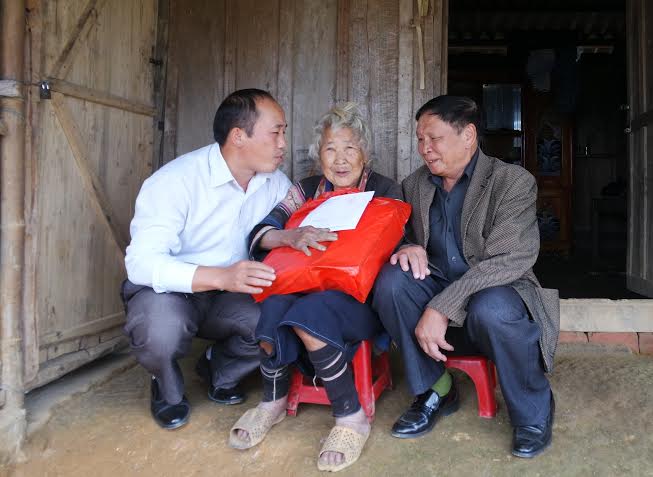By 2030, 100% of elderly people will not have to live in temporary dilapidated houses in Vietnam
In the National Strategy on the Elderly until 2035 with a vision to 2045, it has set the target that by 2030, 100% of the elderly will not have to live in temporary or dilapidated houses in Vietnam.

By 2030, 100% of elderly people will not have to live in temporary dilapidated houses in Vietnam (Image from the internet)
On February 21, 2025, the Prime Minister of Vietnam issued Decision 383/QD-TTg approving the National Strategy on the Elderly until 2035 with a vision towards 2045.
By 2030, 100% of elderly people will not have to live in temporary dilapidated houses in Vietnam
The National Strategy on the Elderly until 2035, with a vision towards 2045, applies to the elderly, prioritizing those in difficult circumstances, illness; households with elderly members; the Elderly Association and organizations related to the elderly. It will be implemented nationwide.
From 2025 to 2030, the Strategy outlines specific goals and criteria as follows:
- At least 50% of the elderly who need and are able to work will be employed; at least 100,000 elderly people will receive vocational guidance, and occupational transition training at vocational education institutions, social assistance centers, and employment service centers; at least 100,000 households with elderly people who need and qualify will receive loans for startups, production, and business development at preferential interest rates.
- At least 60% of communes, wards, and commune-level towns will have cultural, artistic, physical fitness, and sports clubs for the elderly, attracting them to engage in physical fitness, sports, culture, and arts activities.
- At least 50% of communes, wards, and commune-level towns will have intergenerational self-help clubs or models of care clubs to promote the role of the elderly.
- At least 80% of communes, wards, and commune-level towns will have funds to care for and promote the role of the elderly.
- 100% of the elderly will have health insurance cards; at least 90% of the elderly will receive prompt primary health care, periodic health examinations, and have health records; 100% of the elderly in sickness or during epidemics will receive medical examination and treatment, and care from family and community.
- At least 50% of general hospitals, specialized hospitals (excluding pediatric and rehabilitation hospitals), and traditional medicine hospitals with a scale of 50 beds or more will organize separate examination rooms for the elderly in the examination department and provide inpatient treatment beds for the elderly. 50% of provincial-level general, specialized hospitals will have geriatric departments.
- Annually, at least 80% of elderly people in difficult circumstances, illness will access medical services in various forms; 70% of disabled elderly people will be screened, identified with types of disabilities, and receive intervention, rehabilitation; at least 10,000 elderly people in difficult circumstances without caregivers will receive care, rehabilitation, and appropriate assistance at rehabilitation facilities and social assistance centers.
- 100% of severely mentally ill elderly and wandering elderly will be received, cared for, and rehabilitated at social assistance centers.
- 100% of the elderly will not have to live in temporary or dilapidated houses.
- 100% of impoverished elderly, without caregivers, will benefit from social assistance policies as prescribed by law.
- At least 80% of elderly people in financial difficulty, victims of violence, and abuse will be provided legal aid services as prescribed by the law on legal assistance when needed.
- At least 50% of families with elderly people suffering from dementia, severe disabilities, and other difficulties will be trained, guided, and have awareness and skills enhanced for caring, assisting, and rehabilitating the elderly.
- At least 80% of central and local news and broadcasting agencies will have sections on the elderly, which will be published, transmitted, and broadcast at least once a week; at least 50% of the elderly will access and use information and communication technology products.
More details can be found in Decision 383/QD-TTg, effective from February 21, 2025.
- Key word:
- dilapidated house
- elderly people
- Vietnam
- Number of deputy directors of departments in Vietnam in accordance with Decree 45/2025/ND-CP
- Cases ineligible for pardon in Vietnam in 2025
- Decree 50/2025 amending Decree 151/2017 on the management of public assets in Vietnam
- Circular 07/2025 amending Circular 02/2022 on the Law on Environmental Protection in Vietnam
- Adjustment to the organizational structure of the Ministry of Health of Vietnam: Certain agencies are no longer listed in the organizational structure
- Vietnam aims to welcome 22-23 million international tourists in Vietnam in 2025
-

- Number of deputy directors of departments in Vietnam ...
- 15:04, 05/03/2025
-

- Cases ineligible for pardon in Vietnam in 2025
- 14:43, 05/03/2025
-

- Decree 50/2025 amending Decree 151/2017 on the ...
- 12:00, 05/03/2025
-

- Circular 07/2025 amending Circular 02/2022 on ...
- 11:30, 05/03/2025
-

- Adjustment to the organizational structure of ...
- 10:34, 05/03/2025
-

- Notable new policies of Vietnam effective as of ...
- 16:26, 11/04/2025
-
.Medium.png)
- Notable documents of Vietnam in the previous week ...
- 16:21, 11/04/2025
-
.Medium.png)
- Notable documents of Vietnam in the previous week ...
- 16:11, 02/04/2025
-
.Medium.png)
- Notable new policies of Vietnam to be effective ...
- 16:04, 02/04/2025
-
.Medium.png)
- Notable new policies of Vietnam effective from ...
- 14:51, 21/03/2025

 Article table of contents
Article table of contents
